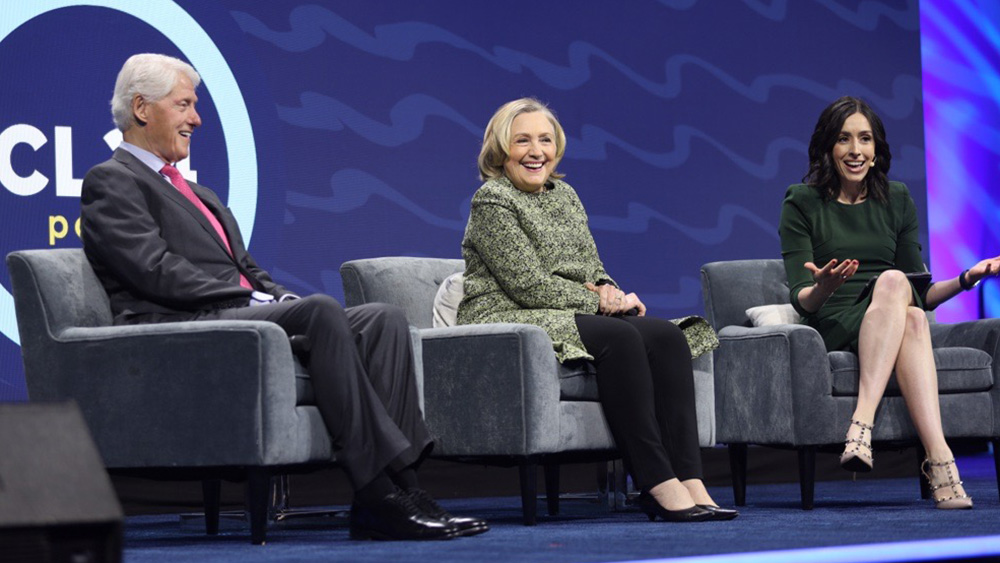
President Bill Clinton and 67th Secretary of State Hillary Rodham Clinton discussed a wide range of topics on Tuesday with Convening Leaders 2024 moderator Holly Ransom. (Whatever Media Group)
In a conversation with Convening Leaders 2024 emcee Holly Ransom on Tuesday morning, President Bill Clinton and 67th Secretary of State Hillary Rodham Clinton discussed the value of in-person meetings for democracy and idea exchange.
While the fireside chat was wide-ranging, both Clintons stressed the significance of face-to-face contact as an antidote to the polarized and divisive climate prevalent in society, highlighting the need for recognizing shared humanity and learning from diverse perspectives.
Secretary Clinton discussed the intersection of mental health and political manipulation, where loneliness can be exploited by unscrupulous actors to deepen societal divisions, underscoring the need for fostering human connections to combat this phenomenon.
“Sadly, that whole problem of loneliness has been what I call ‘weaponized,’” she said. “There will be a flood of mis- and disinformation, and … it’s not just a social and political [challenge]. It’s also an economic challenge.”
President Clinton talked about how personal connections and civil discourse can humanize political (or other) opponents, highlight common ground, and temper reactionary impulses. “I think we have to begin to deal with each other in an effective way,” he said. “That’s why I do … events with former President [George W.] Bush and we fight like cats and dogs over things. We disagree, but we respect each other. And we care for each other. And we think we’re in the business of searching for solutions.”
Below are more takeaways from the conversation, which were generated live during the discussion by Spark Takeaways, a new feature in Spark AI, a generative AI tool created by Gevme in collaboration with PCMA. Convene has collected the information from both Spark’s takeaways and the “idea cloud” it creates with more insights from the live sessions it “listens” to. Learn more at Spark’s website.
Global Political Landscape: The Imperative of Democratic Empowerment
President Clinton emphasized the importance of empowering citizens in a democracy over succumbing to victim politics, suggesting that sustainable political systems should enable individuals to make decisions about their lives rather than be dictated by autocratic regimes.
“I think that when I listen to people talk, I’m always listening to whether their messages are about empowering other people or [they’re] saying, ‘They’re screwing you and only I can protect you. Give me power.’ I like the first better than the second.”
Women in Public Life: Evolving Standards and Persistent Challenges
Secretary Clinton addressed the evolving yet persistent double standards faced by women in public roles, advocating for women to be judged on their competencies rather than appearance or personal life, while acknowledging gradual improvements over these sexist attitudes.
“But I will argue there is still a double standard, and the double standard is much harsher than it should be — even today where women have no margin for error.”
The Art of Disagreement: Politics at the Kitchen Table
The Clintons highlighted the value of respectful disagreement and debate, suggesting that reenacting political discussions in a non-confrontational manner could foster better understanding and more informed decision-making among citizens.
“People in politics say all kinds of things — you know that. And we obviously know that. It would be, I think, a good exercise to do with some trusted friends. Just say, ‘Okay, you play so-and-so and I’m going to play so-and-so.’”
Leadership and Optimism: A Balanced Perspective
The Clintons concluded with a message of optimism tempered by caution, urging leaders to engage in clear communication, seek common ground, and maintain hope while addressing the challenges of the present and future.
“I’m an optimist who worries a lot,” said Secretary Clinton, quoting Madeleine Albright.
AI and the Future: The Need for Regulation and Guardrails
Secretary Clinton expressed concerns about the rapid advancement of AI technology, emphasizing the need for regulatory frameworks to maximize benefits while minimizing risks, including employment disruptions and misinformation.
“We need regulation, guardrails, and protections so that we get the positive. Not the negative.”
The Weight of Decision Making: Energy and Consequence Management
Secretary Clinton reflected on how she had to manage her energy and navigate the consequences of critical decisions, sharing her experience during deliberations by members of the U.S. government in 2011 to raid the hideout of Osama bin Laden, the founder of the Islamist militant group al-Qaeda.
“Hard decision making is exhausting, and I think a lot of people don’t recognize that.”
Navigating Global Conflicts: The Role of Support and Resolution
Secretary Clinton provided insights into complex global conflicts, advocating for unwavering support for Ukraine and a nuanced approach to the Israeli-Palestinian conflict, emphasizing the importance of both defense and the pursuit of peace.
“We have to support the Ukrainians and their struggle to maintain their own country and their own democracy against the aggressor, Putin and Russia.”
